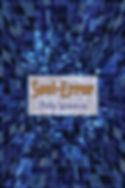Soul-Error
- Philip Weinstein
- Mar 9, 2022
- 3 min read
Updated: Apr 4, 2022
Read an excerpt below:
“My title suggests something awry at our human core. The opening chapter of the same title (a phrase from the Renaissance philosopher, Montaigne) lays out the book’s germinal idea. All the subsequent chapters—conceived as companion pieces to “soul-error”—develop the main idea in the same way: by grounding it in the personal context of my life. They do so because I seek to fuse two domains often kept apart, but which we know to be entwined: how our lives actually unfold, and how that unfolding bears on the life of the mind. Sometimes we need to attend not just to the structure of thinking, but also to the person doing the thinking. In recognizing these two domains as not opposed but conjoined, I turn again to Montaigne as model. His essays draw on personal experience, yet he has no interest in the merely personal. His criterion is clear. Autobiographical instances are valid only insofar as they shed light on experience that is broadly shared. In addition, intellectual claims that have passed through the filter of personal experience may take on a special hue—a hue that reveals the price one has paid for them. My book reaches upward, but it does so by walking on the ground. The chapters in Soul-Error abide by this double-edged criterion. They are rooted in my own life, yet they seek to delineate something far larger and impersonal. I begin with the premise that launches this book and makes its chapters echoing chambers: soul-error. The claim that soul might be twinned to error seems implausible. Thinkers in the West have typically understood soul as our dearest faculty: essential if not immortal, and hardly given to spatial and temporal error. Yet, over four centuries ago, Montaigne coined the phrase “soul-error” to characterize an incorrigible human proclivity: we overvalue what we do not have and we undervalue what we already have. This tendency to assess others and objects differently, according to whether they are here or far away—ours or not (yet) ours—is only more pronounced when it comes to assessing them over time. Retrospective and prospective takes diverge radically from our understanding of what is here and now. Getting the future wrong is familiar enough—we are all failed soothsayers—but getting the past wrong is more insidious and perhaps even harder to avoid. Indeed, we call recognition our uniquely human capacity to revisit the past and identify earlier deceptions. Could we bear to live out our life without the possibility of revision? Are we prepared to take the measure of how much of our past life we thus revise as error?"

This book and others by Philip Weinstein are available for purchase on Amazon.
Editorial Reviews
"Soul-Error is an invitation to travel and Phil Weinstein is an irresistible guide. Wry, perceptive, and unfailingly honest, he takes us on a journey that begins in the Memphis bedroom of his childhood with the nightly ritual he and his twin brother invent and ends with the late-life wisdom: "we become ourselves not all at once but over time, again and again." Soul-Error refers to the mistakes we invariably make along the way including our proclivity to undervalue what we have and overvalue what we do not have, but also our willingness to ask the soul-searching questions: Why did I do that? Who was I then? and Who am I now? With this quietly remarkable book, Phil Weinstein makes his life the text for exploring the difference between the way life is lived and how it is told."
Carol Gilligan, author of In a Different Voice and most recently,
Why Does Patriarchy Persist? (with Naomi Snider).
"Philip Weinstein's Soul-Error admirably joins the personal-biographical voice with that of the intellectual. Regardless of how our academic protocols insist on separating the two, we know--as Montaigne did--that they nourish each other continuously, and we are lucky that they do so in Weinstein’s book."
André Aciman, author of the best-selling novel, Call Me By Your Name









